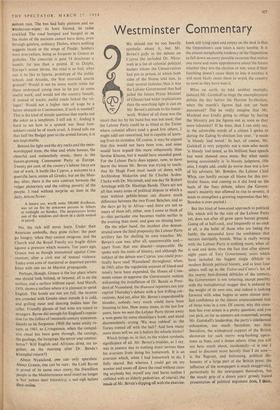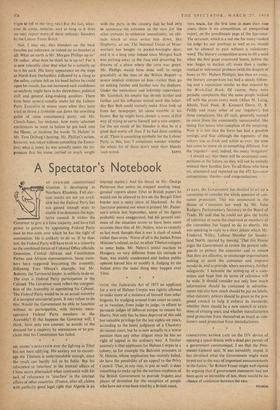Westminster Commentary
WE shol uld not be too heavily symbolic about it, but Mr. Bevan's gaffe in the debate on Cyprus (he included Dr. Nkru- mah i,n a list of colonial political leaders whom the Conservatives had put in prison, at which both sides of the House told him, in their several fashions,•that it was the Labour Government that had jailed the future Prime Minister of Ghana) had wider implications than the searching light it cast on Mr. Bevan's attitude to his home- work. Widest of all these was the retort that lay by his hand but was not used; that the Labour Party could be as blind as the Tories where colonial affairs (and a good few others, I might add) are concerned, but is capable of learn- ing from its mistakes. Of course, it may be argued that this would not have been true, and none would have argued this more vehemently than Seretse Khama, but it would have sounded good. For the Labour Party does appear, now, to have learnt the lesson Mr. Bevan was trying to teach; that Sir Hugh Foot must needs sit down with Archbishop Makarios and Sir Charles Arden- Clarke with Dr. Nkrumah, and one day Sir Robert Armitage with Dr. Hastings Banda. There are not all that many areas of political dispute in which a man without pebble-lenses can discern much difference between the two Front Benches, and as the days go by in Africa—and there are not so many of them left, either, now I come to think of it—this particular one becomes visible earlier in the evening than most, and goes on shining later.
On the other hand, the incident also demon- strated anew the fatal propensity the Labour Party artillery has for shelling its own trenches. Mr. Bevan's case was, after all, unanswerable and— apart from that one disaster—impeccable. He spoke with the tones of history, and although the subject of the debate was Cyprus, you could prac- tically have read 'Nyasaland' throughout; when, in 1965, after the regulation amount of blood and misery have been expended, the House of Com- mons comes to approve the Government motion welcoming the installation of Dr. Banda as Presi- dent of Nyasaland, the Hansard reporters can just reprint Thursday's debate with a few trifling cor- rections. And yet, after Mr. Bevan's unpardonable blunder, nobody very much could have been listening to him. How many times, in the last few years, have we seen the Labour Party throw away a won game by some elementary boob, and stand disconsolately crying 'We wuz robbed' as the Tories trotted off with the ball? And how many more times will we see it before the whistle blows?
Which brings us, in fact, to the widest symbolic significance of all. Mr. Bevan's mistake, as I say, was in essence due to nothing more serious than his aversion from doing his homework. It is an aversion which, when I had homework to do, I fully shared. But whereas I could get on my scooter and zoom off down the road without caus- ing anybody but myself any real harm (unless I collided with an elderly pedestrian, of course), the result of Mr. Bevan's slipping off with the exercise- book still lying open and empty on the desk is that the Opposition's case takes a nasty tumble. It is the almost inexplicable tendency of the Opposition to fall down on every possible occasion that makes one more and more apprehensive about the future whether they win the election or not; since if their fumbling doesn't cause them to lose it anyway it will most likely cause them to wreck the country as soon as they have won it.
What on earth, to take another example, induced Mr. Gaitskell to stage the unemployment debate the day before the Harrow by-election, when the month's figures had not yet been announced? Did he really imagine that Mr. Macleod was kindly going to oblige by having the Ministry put the figures out as soon as they were tabulated? If he does, then I can only say, in the admirable words of a citizen I spoke to during the Ealing by-election last year, "e needs 'is bloody 'ead tested.' In fact, of course, Mr. Gaitskell is very palpably not a man, who. needs 'is bloody 'ead tested, as his brilliant Suez speech last week showed once more. But what needs testing occasionally is 'is bloody judgment. (He also, I might add, could do worse than test a few of his advisers; Mr. Bowden, the Labour Chief Whip, can hardly escape all blame for this par- ticular fiasco, and coming as it did hard on the heels of the Suez debate, where the Govern- ment's majority was allowed to rise to seventy, it tends to strengthen a growing impression that Mr. Bowden is over-parted.) But this kind of boss-eyed approach to political life, which will be the ruin of the Labour Party yet, does not after all grow upon barren ground. Going off at half-cock, and frequently at no cock at all, is the habit of those who are losing the battle; the successful have the confidence that success inevitably breeds. What is really wrong with the Labour Party is nothing more, when all is said and done, than the fact that after almost eight years of Tory Government, years which have included the biggest single &Mete • in modern British political history, and at least four others well . up in the Tailor-and-Cutter's list of the twenty best-dressed debAcles of the century, the Government is not tottering, except possibly with the metaphorical stagger that is induced by the weight of its own sins, and indeed is looking forward with what begins to seem almost justi- fied confidence to the almost unprecedented feat of three wins in a row. Of course, why this situa- tion has ever arisen is a pretty question; and you can pick, as far as answers are concerned, among Mr. Gaitskell's leadership, the party's intellectual exhaustion, too much Socialism, too little Socialism, the widespread support of the British electorate for such merry wog-bashing opera- tions as Suez, and a dozen others. (Orie you will not hear much about, incidentally—it is one I used to discount more heavily than I do now— is the flagrant, and increasing, political dis- honesty of a largo part of the British press; the influence of the newspapers is much exaggerated, particularly by the newspapers themselves, but the steady grip of a dozen years' grossly biased presentation of political argument does, 1-think,
l.tgin to tell in the long run.) But the fact, what- ever its cause, remains, and as long as it does we may expect more of these unhappy blunders by the Labour Front Bench.
Not, I may say, that blunders on the hack benches are unknown, or indeed on no benches at all. What on earth is Mr. Morgan Phillips up to? Or rather, what does he think he is up to? For it is now tolerably clear that what he is actually up to is his neck. His hasty appearance on the stage at North-East Derbyshire, followed by a clang as the safety curtain fell on his head before he could open his mouth, has not increased such confidence as anybody might have in his shrewdness, political skill and general king-making qualities. There have been several notable snubs for the Labour Party Executive in recent years when they have tried to thrust a favourite son down the unwilling gullet of some constituency party; ask Mr. Creech-Jones, for instance, how many selection conferences he went to before he got back into the House, or mention the words 'St. Helens' in Mr. Tom Driberg's hearing. Mr. Phillips's action, however, was taken without consulting the Execu- tive; what is more, he was actually under the im- pression that his name carried so much weight
with the party in the country that he had only to announce his entrance to the race for the other entrants to withdraw immediately, an atti- tude which at once writes him down, like Dogberry, an ass. The National Union of Mine- workers has bought its pocket-boroughs dear; and it is a long time indeed since Morgan bach was picking away at the face and dreaming his dreams of a place where the corn was green. Mr. Phillips would have done well to resign gracefully at the time of the Wilson Report—a severe implicit criticism of him--rather than go on sinking farther and farther into the shadows. Under the meticulous and infinitely supervisory Mr. Gaitskell, his empire has shrunk farther and farther and his influence waned until this latter- day Ben Bolt could scarcely, make Alice look up from her newspaper, let alone tremble at his frown. But he might have chosen a more skilful way of trying to carve himself out a new empire; for the net result of his blunder is that he is a good deal worse off than if he had done nothing at all. There is something symbolic for the Labour Party in this, too; I sometimes wonder whether the whole lot of them don't need their bloody







































 Previous page
Previous page